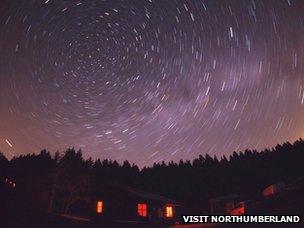Dark-sky status awarded to Northumberland Park area
- Published
Dark Sky Park status means the potential for astro-tourism, as Danny Savage reports
A patch of Northumberland's night sky has become the largest area of protected sky in Europe.
Northumberland National Park and Kielder Water and Forest Park have been granted dark-sky status by The International Dark Skies Association.
The status means the night sky is protected and lighting controls are in place to prevent light pollution.
In honour of the award the area will be renamed Northumberland Dark Sky Park later on Monday.
'Cosmic panorama'
The two-year campaign to protect the 579 square mile (1,500 sq km) area was jointly led by Northumberland National Park Authority, Kielder Water and Forest Park Development Trust and Kielder Observatory Astronomical Society.
The International Dark Skies Association (IDA), based in Tucson, Arizona, granted it gold status, which is the highest accolade it can bestow.
Steve Owens, dark skies consultant and chair of the IDA's development committee, said: "The quality of Northumberland's night sky, and the huge efforts made by local communities to preserve them, make Northumberland Dark Sky Park a gold tier site, and one of the best places to stargaze in Europe."
Elisabeth Rowark, director of the park's trust, said: "We have worked so hard together to reach this tremendous day for everyone committed to securing protection for England's largest area of starry skies.
"We do not want to turn off the lights, but rather encourage better lighting using the latest technology. This is the start of a new chapter for Northumberland where quite literally the sky is the limit."
A new lighting management plan will guide planning authorities in ensuring new developments take account of the night sky.
The park's darkest areas, which are mostly uninhabited, will remain light-free.
Sir Martin Rees, Astronomer Royal for England, said: "All humans, everywhere in the world and throughout history, have looked up at the sky and wondered at it.

The park's darkest areas, which are mostly uninhabited, will remain light-free.
"This experience is now denied to most people, because of the background light in towns and cities. It is important to ensure that there will be somewhere in England where young people can fully enjoy a cosmic panorama."
'Rampant light pollution'
Organisers they hoped the award would boost "astro-tourism" in the North East.
About 50,000 people have visited the Kielder Observatory since it opened in 2008 to explore the night sky.
Gary Fildes, founding director of the observatory, said: "We have known for a long time that this is a special place, but we also know how fragile a truly dark sky is when so much has been lost to rampant light pollution.
"Together with other stargazers I'm relieved, excited and delighted to see that these magical skies have at last been recognised and protected."
Bob Mizon, from the British Astronomical Association Campaign for Dark Skies, said: "The UK leads the way in protecting its best starry night skies and this project will add a new star to the constellation of dark-sky preservation areas.
"People are becoming more appreciative of the wonders of the universe. Experiencing them in places like the Northumberland Dark Sky Park will encourage them to protect their own local night sky from the ravages of wasted light."
- Published9 December 2013
- Published8 May 2013
- Published5 March 2013
- Published19 February 2013
- Published7 January 2013